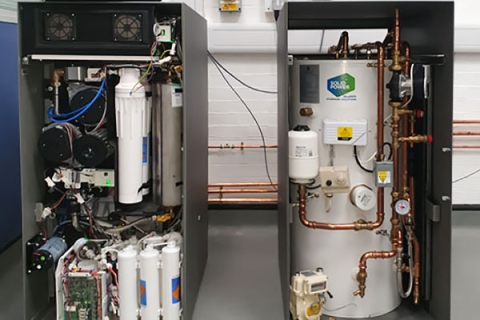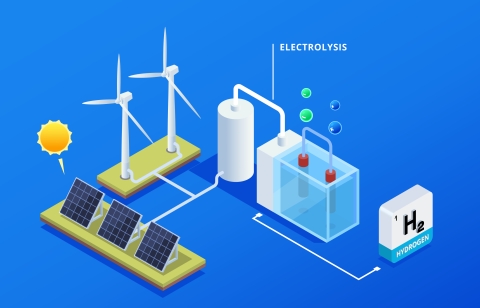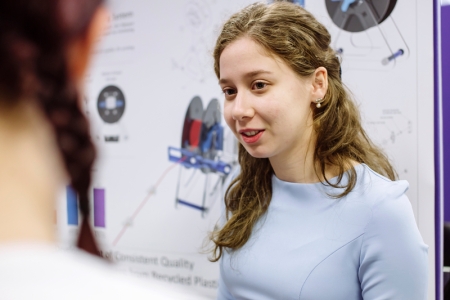
Key information
UCAS code:
H892, H893
Accreditation:
This course is Accredited
Typical offer:
112-120 points (BEng) / 120-128 points (MEng), from 2 or 3 A levels or equivalent, to include a relevant subject
Clearing Hotline: 023 9284 8074
Showing content for section Overview
Overview
Apply now through Clearing
If you have your results, you can apply directly to us now to start in September 2024.
The UK Government has committed £12 billion of funding for a Green Industrial Revolution. Join the fight against climate change, find solutions to society's reliance on fossil fuels and be part of the next great energy transformation.
On this Renewable Energy Engineering degree, you'll study a branch of engineering that focuses on powering the world sustainably. From energy conversion and storage technology, to low carbon heating systems, electrical circuit analysis and large network grids, you'll develop the engineering skills and technical knowledge you need to design, assess and improve electrical, renewable and alternative energy systems that benefit the climate and society.
Follow in the footsteps of engineers who worked on radical advancements such as solar-powered drones and the hydrogen fuel used to heat and power green homes.
BEng or MEng?
You can study this course as a 3-year Bachelor's degree (BEng) or a 4-year integrated Master's degree (MEng). The MEng allows you to achieve a Master’s level degree with just one extra year of undergraduate study, further enhancing your career prospects.
Study Renewable Energy Engineering to be part of a future facing up to climate change
Studying for a degree in renewable energy means finding solutions to the biggest threat to our planet. Watch to learn more about the subjects you'll study, the facilities you'll use, and the growing industry you'll be equipped to join when you graduate.
Climate change is the biggest threat to our planet. With a degree in Renewable Energy Engineering from the University of Portsmouth, you'll enter into a vital industry focused on solutions that are needed to reverse the effects.
The transition to clean energy is expected to generate 10.3 million net new jobs globally by 2030. This huge growth will mean that the opportunities your degree will unlock are endless.
Our bachelor's and integrated master's courses have been created by experts in the industry. We use these partners and our professional networks to develop the course content, making use of real life challenges that are happening in the sector. We have access to a database of energy generation, solar PV farms and fuel cells to help analyse real life scenarios.
Key modules include: solar and wind energy, energy conversion, sustainable transport, energy efficient buildings, smart grid management, and many others. With the option to specialise in your area of interest, these modules will equip you with the right blend of knowledge and skills to integrate renewable energy projects.
On campus you can learn from initiatives like our use of solar panels to heat water for our university cafes, the commitment to our electricity being 100% renewable and our aim to be climate positive by 2030.
At Portsmouth, we also have a number of specialist labs containing state of the art hydrogen and fuel cell testing equipment, battery testing equipment in our Port Eco House, solar PV and solar thermal equipment, wind tunnels for testing wind turbine blades, and electrolysers.
We need your innovative ideas to sustain our world. Clean energy is part of a future that you can help secure.
Choose a university that will prepare you to tackle these challenges with expert knowledge and cutting edge facilities. Choose Portsmouth.
Course highlights
- Design renewable energy systems for electricity, transport or heating applications, for residential and commercial markets
- Use cost analysis to compare renewable energy technologies with traditional fuel systems from the points of view of business, industry and maintenance
- Get a better understanding of solar PV, wind turbines, batteries, hydrogen energy, energy-efficient buildings and sustainable transport.
- Learn about many aspects of smart grid management, energy storage, charging of electric vehicles and system automation
- Work in industry on optional modules or your optional placement year, networking with and working alongside established experts and prospective employers
Accreditation
This course is accredited by the Institution of Engineering and Technology (IET). The MEng meets in full the academic requirement for registration as CEng (Chartered Engineer), while the BEng partially meets these requirements.

Top 30
for student satisfaction
(Times Higher Education, 2024)
Renewable energy is the future. This industry-based course provides the knowledge and tools to produce real solutions, including learning the potential for various everchanging technologies.
Contact information
Contact AdmissionsClearing Hotline: 023 9284 8074
Clearing is open
This course is available through Clearing.
Apply now through Clearing
If you have your results, you can apply directly to us now to start in September 2024.
Guaranteed accommodation

Connected Degrees®
Only at Portsmouth you have the choice to take a traditional sandwich placement before your third year, or to take your placement after your final year.
Upbeat music plays over information about Connected Degrees® from the University of Portsmouth.
Discover how Clearing works
Clearing 2024 opens on 5 July and closes on 21 October
Every year thousands of students find their ideal undergraduate course through Clearing. Clearing matches students who are looking for a different course or university from their original choice, or who are applying for the very first time after 30 June, to courses that universities still have places on.
The majority of people apply through Clearing once they receive their exam results on A level / T level results day (15 August 2024).
You can apply through Clearing if:
- You don't meet the conditions of your offer for your firm (first) or insurance (second) choice courses
- Your exam results are better than you expected and you want to change your course or university
- You don't hold any offers
- You've accepted an offer but changed your mind about the course you want to do
- You're applying for the first time after 30 June 2024
Yes, we welcome Clearing applications from international students and you can apply in exactly the same way as UK students do.
The majority of UK students apply through Clearing once they receive their A level / T level results in August 2024, so as an international student if you already have your exam results you can apply when Clearing opens.
Make sure that you have time to get your visa, funding, and English language certification sorted out before the beginning of term.
If you would like further information or guidance, please contact our international office for advice.
The entry requirements for courses can change in Clearing but if you want an idea of what grades we usually accept, take a look at our undergraduate course pages.
Even if you don't quite meet the entry requirements, we'd still encourage you to apply as you could still get a place.
Book your place at our Clearing visit day
Join us on campus Thursday 8 August, 10am-3pm
Yes, our four career-focused undergraduate courses at our growing London campus are available to apply for through Clearing.
Webinar: Applying to uni through Clearing
Yes, you can join our webinar on Tue, Aug 6, 2024 4:00 PM - 5:00 PM BST and we'll tell you all about the Clearing process.
Clearing Hotline: 023 9284 8074
Entry requirements
BEng (Hons) Renewable Energy Engineering entry requirements
Typical offers
- UCAS points - 112-120 points from 2 or 3 A levels, or equivalent, to include a relevant subject. (calculate your UCAS points)
- A levels - BBB-BBC, to include a relevant subject.
Relevant subjects: Further Mathematics; Mathematics; Statistics ; Physics; Electronics. - T-levels - Merit
Acceptable T Level Subjects: T Level in Construction: Design, Surveying and Planning, T Level in Building Services Engineering, T Level in Engineering and Manufacturing Design and Development, T Level in Maintenance, Installation and Repair for Engineering and Manufacturing, T Level in Engineering, Manufacturing, Processing and Control - BTECs (Extended Diplomas) - DDM-DMM
- International Baccalaureate - 29
You may need to have studied specific subjects – find full entry requirements and other qualifications we accept.
English language requirements
- English language proficiency at a minimum of IELTS band 6.0 with no component score below 5.5.
See alternative English language qualifications
We also accept other standard English tests and qualifications, as long as they meet the minimum requirements of your course.
If you don't meet the English language requirements yet, you can achieve the level you need by successfully completing a pre-sessional English programme before you start your course.
Typical offers
- UCAS points - 112-120 points from 2 or 3 A levels, or equivalent, to include a relevant subject. (calculate your UCAS points)
- A levels - BBB-BBC, to include a relevant subject.
Relevant subjects: Further Mathematics; Mathematics; Statistics ; Physics; Electronics. - T-levels - Merit
Acceptable T Level Subjects: T Level in Construction: Design, Surveying and Planning, T Level in Building Services Engineering, T Level in Engineering and Manufacturing Design and Development, T Level in Maintenance, Installation and Repair for Engineering and Manufacturing, T Level in Engineering, Manufacturing, Processing and Control - BTECs (Extended Diplomas) - DDM-DMM
- International Baccalaureate - 29
You may need to have studied specific subjects or GCSEs – find full entry requirements and other qualifications we accept.
English language requirements
- English language proficiency at a minimum of IELTS band 6.0 with no component score below 5.5.
See alternative English language qualifications
We also accept other standard English tests and qualifications, as long as they meet the minimum requirements of your course.
If you don't meet the English language requirements yet, you can achieve the level you need by successfully completing a pre-sessional English programme before you start your course.
If you don't meet the entry requirements, you may be able to join this course after you successfully complete a foundation year.
MEng Renewable Energy Engineering entry requirements
Typical offers
- UCAS points - 120-128 points from 2 or 3 A levels, or equivalent, to include a relevant subject. (calculate your UCAS points)
- A levels - ABB-BBB, to include a relevant subject.
Relevant subjects: Further Mathematics; Mathematics; Statistics ; Physics; Electronics. - T-levels - Merit
Acceptable T Level Subjects: T Level in Construction: Design, Surveying and Planning, T Level in Building Services Engineering, T Level in Engineering and Manufacturing Design and Development, T Level in Maintenance, Installation and Repair for Engineering and Manufacturing, T Level in Engineering, Manufacturing, Processing and Control - BTECs (Extended Diplomas) - DDM
- International Baccalaureate - 29-30
You may need to have studied specific subjects – find full entry requirements and other qualifications we accept.
English language requirements
- English language proficiency at a minimum of IELTS band 6.0 with no component score below 5.5.
See alternative English language qualifications
We also accept other standard English tests and qualifications, as long as they meet the minimum requirements of your course.
If you don't meet the English language requirements yet, you can achieve the level you need by successfully completing a pre-sessional English programme before you start your course.
Typical offers
- UCAS points - 120-128 points from 2 or 3 A levels, or equivalent, to include a relevant subject. (calculate your UCAS points)
- A levels - ABB-BBB, to include a relevant subject.
Relevant subjects: Further Mathematics; Mathematics; Statistics ; Physics; Electronics. - T-levels - Merit
Acceptable T Level Subjects: T Level in Construction: Design, Surveying and Planning, T Level in Building Services Engineering, T Level in Engineering and Manufacturing Design and Development, T Level in Maintenance, Installation and Repair for Engineering and Manufacturing, T Level in Engineering, Manufacturing, Processing and Control - BTECs (Extended Diplomas) - DDM
- International Baccalaureate - 29-30
You may need to have studied specific subjects or GCSEs – find full entry requirements and other qualifications we accept.
English language requirements
- English language proficiency at a minimum of IELTS band 6.0 with no component score below 5.5.
See alternative English language qualifications
We also accept other standard English tests and qualifications, as long as they meet the minimum requirements of your course.
If you don't meet the English language requirements yet, you can achieve the level you need by successfully completing a pre-sessional English programme before you start your course.
We look at more than just your grades
While we consider your grades when making an offer, we also carefully look at your circumstances and other factors to assess your potential. These include whether you live and work in the region and your personal and family circumstances which we assess using established data.
Facilities and specialist equipment

Fuel Cell Laboratory
Our new solid oxide fuel cell will produce electricity and heat, powered by natural gas or bio-methane at a greater efficiency than conventional gas boilers. You'll have access to the lab to study all type of fuel cells, electrolysers for hydrogen production and batteries. You'll also develop your own prototypes or control systems for rapid battery charging for electric vehicles, the smart grid or for hydrogen production.

Solar Living Lab
Solar photovoltaic panels have been installed next to the Port-Eco House, used for research into the energy efficiency and building performance of houses, and smart Tesla Powerwall batteries have been installed inside the Port-Eco House and the Future Technology Centre, which has rooftop solar panels and photovoltaic windows.

Renewable Energy Lab
Students and researchers address sustainable power and decarbonisation issues with modelling software and physical equipment in our Renewable Energy Laboratory.
Software, hardware and equipment
You'll get to grips with the specialist software packages and equipment that you'll use in your career, in our computer, electronic systems, energy and electrical systems labs.
- Mat lab/Simulink
- Eagle
- Lucas-Nuelle networked analysis and control software
- Allen-Bradley software
- IDE
- Servo set
- Servomechanism
- Super-heterodyne radio receivers
- 3D scanning microscopy facilities
- Computer-aided design (CAD) suite
- Oscilloscopes with 80MHz/2Gbps digital capability
- Programmable function generators
- Spectrum analysers
- Process control systems
- Programmable logic controllers
- Synchronous/asynchronous electric machines
- Power electronics and drive circuitry elements and blocks
- PLC training kit
Careers and opportunities
When you graduate, you'll be ready for a career working at the forefront of the technology responsible for renewable energy. Not only is the work rewarding, but you'll be working in a highly skilled area, which is always in-demand, and get to be part of the solution to one of the most pressing issues facing society.
In 2030 across England there could be as many as 694,000 direct jobs employed in the low-carbon and renewable energy economy, rising to over 1.18 million by 2050.
Local Government Association
Local Green Jobs Report (2020)
You'll graduate with the skills and understanding to work in many related areas, including:
- Energy generation – such as in solar or wind power
- Energy conversion and storage – in areas such as batteries and hydrogen fuel cell technologies.
- Sustainable transport systems – in fields such as electric vehicles, charging infrastructure, as well as hydrogen and biomethane vehicles
- Low carbon heating systems – such as in solar, thermal, hydrogen energy, as well as biomethane and heat pumps
- Energy efficient buildings – in areas such as energy conservation, new materials, smart energy management and energy audits
- Security – working to improve national security by working on new technologies and infrastructure
What jobs can you do with a renewable energy engineering degree?
You'll be able to take roles such as:
- solar PV system engineer
- wind energy engineer
- energy storage engineer (battery specialist)
- hydrogen energy system engineer
- fuel cell system engineer
- zero carbon heating engineer
- electric vehicle charging specialist
- smart grid engineer
- energy management specialist
- energy audit specialist
- business development manager

Ongoing career support – up to 5 years after you graduate
Get experience while you study, with support to find part-time jobs, volunteering opportunities, and work experience.
Towards the end of your degree and for up to five years after graduation, you’ll receive one-to-one support from our Graduate Recruitment Consultancy to help you find your perfect role.
When you graduate you'll also be able to pursue further studies at postgraduate level, or set up your own businesses with help and support from the University.
Placement year (optional)
After your second year, you can do an optional paid work placement year to get valuable longer-term work experience in the industry. You might work in the UK, or take on a role with a company abroad.
Possible placement destinations
- solar energy project developers
- fuel cell and battery manufacturers
- smart grid service providers
- energy storage and energy management businesses
- local councils
- sustainable transportation businesses
- energy research and development companies
We’ll help you secure a work placement that fits your aspirations. You’ll get mentoring and support throughout the year.
You could also choose to set up your own business, or take a voluntary placement.
Work experience and career planning
The Group Design Project module you take in year 2, the Individual Project module you take in year 3, and the Multidisciplinary Group Project you take in year 4 (MEng only), give you the opportunity to get work experience as part of your study.
Career development activity
You'll set up and run a new engineering business as part of your second year study on this course. Do well on this module, and you'll be eligible to apply for a grant from the SENE start-up fund, a pot set up by our School of Energy and Electronic Engineering, and run a business that provides both income and credits toward your degree.
You'll also have access to extracurricular activities, run by the school and by your fellow students, in which you might work on a nationwide drone competition, the Engineers Without Borders Design Challenge, or the Formula Student racing car competition. Our Badges framework gives you a way to demonstrate professional recognition of what you've achieved in and outside your study.

Your final project
Your project work will be on an industry-related or industry-sponsored subject related to renewable energy, or its application. You'll plan your project with consultation from your tutors and, where necessary, external industrial supervisors. Your project will contain elements that boost your future employability, such as a financial analysis of different energy options for a particular business.
We'll also help you to identify additional internships, voluntary roles and opportunities that will further complement your studies, throughout the course.
Modules
Each module on this course is worth a certain number of credits.
In each year, you need to study modules worth a total of 120 credits. For example, 4 modules worth 20 credits and 1 module worth 40 credits.
What you'll study
Core modules
Core modules
Optional modules
Core modules
Core modules
Core modules
On this course, you can do an optional study abroad or work placement year between your 2nd and 3rd years, or after your third year, to get valuable experience working in industry.
We’ll help you secure a work placement that fits your situation and ambitions. You’ll get mentoring and support throughout the year.
Changes to course content
We use the best and most current research and professional practice alongside feedback from our students to make sure course content is relevant to your future career or further studies.
Therefore, course content is revised and regularly reviewed. This may result in changes being made in order to reflect developments in research, learning from practice and changes in policy at both national and local levels.
Teaching
Teaching on this course includes:
- Lectures
- Seminars
- Tutorials
- Laboratory work
- Computer-aided engineering system activity
There's an emphasis on problem solving and project work to reflect the challenges experience in your career. Tasks will often begin with you researching a problem or project brief, before moving on to lab sessions to identify, then implement, practical solutions.
Teaching staff are all members of the IET (Institute of Engineering and Technology), and many are Chartered Engineers. The teaching staff on this course also have a range of professional experience, including working as a team leaders, and in higher management, in industry.
You can access all teaching resources on Moodle, our virtual learning environment, from anywhere with a web connection.
How you're assessed
You'll be assessed through:
- Written examinations
- Coursework
- Practical tests
- Project work
- Presentations
You'll be able to test your skills and knowledge informally before you do assessments that count towards your final mark. For example, you can take online quizzes on theory-related skills, such as electrical circuit network parameters, to get automatic feedback. You also get feedback on lab-related skills through the submission of the logbook you've recorded the details of practical sessions in.
You can get feedback on all practice and formal assessments, so you can improve in the future.
Every Tuesday in term time you'll also attend a 1-hour feedback and support session.
How you'll spend your time
One of the main differences between school or college and university is how much control you have over your learning.
We use a blended learning approach to teaching, which means you’ll take part in both face-to-face and online activities during your studies. As well as attending your timetabled classes you'll study independently in your free time, supported by staff and our virtual learning environment, Moodle.
A typical week
We recommend you spend at least 35 hours a week studying for your degree. You’ll be in timetabled teaching activities such as lectures, practical classes and workshops for about 20 hours a week. As you progress through the course, there's a shift in emphasis from lectures and theory to lab work and implementations. The rest of the time you’ll do independent study such as research, reading, coursework and project work, alone or in a group with others from your course. You'll probably do more independent study and have less scheduled teaching in years 2 and 3 (and 4 if you do the MEng), but this depends on which modules you choose.
Most timetabled teaching takes place during the day, Monday to Friday. Optional field trips may involve evening and weekend teaching or events. There’s usually no teaching on Wednesday afternoons.
Term dates
The academic year runs from September to June. There are breaks at Christmas and Easter.
Supporting you
The amount of timetabled teaching you'll get on your degree might be less than what you're used to at school or college, but you'll also get support via video, phone and face-to-face from teaching and support staff to enhance your learning experience and help you succeed. You can build your personalised network of support from the following people and services:
Types of support
Your personal tutor helps you make the transition to independent study and gives you academic and personal support throughout your time at university.
As well as regular scheduled meetings with your personal tutor, they're also available at set times during the week if you want to chat with them about anything that can't wait until your next meeting.
You'll have help from a team of faculty learning support tutors. They can help you improve and develop your academic skills and support you in any area of your study.
They can help with:
- improving your academic writing (for example, essays, reports, dissertations)
- understanding and using assignment feedback
- managing your time and workload
- revision and exam techniques
As well as support from faculty staff and your personal tutor, you can use the University's Academic Skills Unit (ASK).
ASK provides one-to-one support in areas such as:
- Academic writing
- Note taking
- Time management
- Critical thinking
- Presentation skills
- Referencing
- Working in groups
- Revision, memory and exam techniques
If you have a disability or need extra support, the Additional Support and Disability Centre (ASDAC) will give you help, support and advice.
All our labs and practical spaces are staffed by qualified laboratory support staff. They’ll support you in scheduled lab sessions and can give you one-to-one help when you do practical research projects.
Our online Learning Well mini-course will help you plan for managing the challenges of learning and student life, so you can fulfil your potential and have a great student experience.
You can get personal, emotional and mental health support from our Student Wellbeing Service, in person and online. This includes 1–2–1 support as well as courses and workshops that help you better manage stress, anxiety or depression.
If you require extra support because of a disability or additional learning need our specialist team can help you.
They'll help you to
- discuss and agree on reasonable adjustments
- liaise with other University services and facilities, such as the library
- access specialist study skills and strategies tutors, and assistive technology tutors, on a 1-to-1 basis or in groups
- liaise with external services
Library staff are available in person or by email, phone, or online chat to help you make the most of the University’s library resources. You can also request one-to-one appointments and get support from a librarian who specialises in your subject area.
The library is open 24 hours a day, every day, in term time.
If English isn't your first language, you can do one of our English language courses to improve your written and spoken English language skills before starting your degree. Once you're here, you can take part in our free In-Sessional English (ISE) programme to improve your English further.
The Maths Café offers advice and assistance with mathematical skills in a friendly, informal environment. You can come to our daily drop-in sessions, develop your maths skills at a workshop or use our online resources.
Costs and funding
Tuition fees
- UK/Channel Islands and Isle of Man students – £9,250 per year (may be subject to annual increase)
- EU students – £9,250 a year (including Transition Scholarship)
- International (non-EU) students – £19,200 per year (subject to annual increase)
- UK/Channel Islands and Isle of Man students – £9,250 per year (may be subject to annual increase)
- EU students – £9,250 a year (including Transition Scholarship)
- International (non-EU) students – £19,200 per year (subject to annual increase)
Funding your studies
Find out how to fund your studies, including the scholarships and bursaries you could get. You can also find more about tuition fees and living costs, including what your tuition fees cover.
Applying from outside the UK? Find out about funding options for international students.
Tuition fees terms and conditions
Additional course costs
These course-related costs aren’t included in the tuition fees. So you’ll need to budget for them when you plan your spending.
Additional costs
Our accommodation section show your accommodation options and highlight how much it costs to live in Portsmouth.
You’ll study up to 6 modules a year. You may have to read several recommended books or textbooks for each module.
You can borrow most of these from the Library. If you buy these, they may cost up to £60 each.
We recommend that you budget £75 a year for photocopying, memory sticks, DVDs and CDs, printing charges, binding and specialist printing.
If your final year includes a major project, there could be cost for transport or accommodation related to your research activities. The amount will depend on the project you choose.
If you take a placement year or study abroad year, tuition fees for that year are as follows:
- UK/Channel Islands and Isle of Man students – £1,385 a year (may be subject to annual increase)
- EU students – £1,385 a year, including Transition Scholarship (may be subject to annual increase)
- International students – £2,875 a year (subject to annual increase)
How to apply
Apply now through Clearing
If you have your results, you can apply directly to us now to start in September 2024.
Applying for year 2, 3 or 4
If you've already completed part of this course with us or another university and would like to apply for the second, third or fourth year with us in September 2024, use our online application form.
September 2025 applications
To start this course in 2025, apply through UCAS. You'll need:
- The UCAS course code – H892 (BEng) or H893 (MEng)
- Our institution code – P80
If you'd prefer to apply directly, use our online application form:
You can also sign up to an Open Day to:
Tour our campus, facilities and halls of residence
Speak with lecturers and chat with our students
Get information about where to live, how to fund your studies and which clubs and societies to join
If you're new to the application process, read our guide on applying for an undergraduate course.
Admissions terms and conditions
When you accept an offer to study at the University of Portsmouth, you also agree to abide by our Student Contract (which includes the University's relevant policies, rules and regulations). You should read and consider these before you apply.

